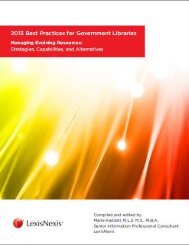2012 Best Practices for Government Libraries
2012 Best Practices for Government Libraries
2012 Best Practices for Government Libraries
Create successful ePaper yourself
Turn your PDF publications into a flip-book with our unique Google optimized e-Paper software.
180<br />
BEST PRACTICES <strong>2012</strong><br />
annual or bi-annual training sessions to practice their behavior in an actual<br />
case of emergency and to refresh their knowledge about possible<br />
hazards/hazardous materials.<br />
Supply list: Popular are lists that outline general as well as emergencyspecific<br />
supplies (e.g. fans to eliminate dampness or safety goggles in case of<br />
a chemical spill). There are many templates of supply lists online that you<br />
can use to create your own. Once completed, you should determine what<br />
needs to be purchased and what may also be available through your<br />
maintenance department. An extensive example that can serve as starting<br />
point can be found at http://www.ready.gov/document/family-supply-list.<br />
Evaluation of your physical space: If you do not have an existing floor<br />
plan, it's time to draw one up. It should indicate the location of public areas<br />
and staff areas, your stacks and exits, sprinkler locations, windows, high-risk<br />
areas <strong>for</strong> fire, water, or another type of emergency. A floor plan will not only<br />
help your staff but also people who might enter the library in case of an<br />
emergency. They will immediately see the most endangered and/or<br />
important locations that should receive attention first.<br />
Collection priorities: Most likely, your library will feature a variety of<br />
different collections such as law materials, technical reports and rare or<br />
oversized books, to name just a few. You should consider what is most<br />
important, which documents could be sacrificed if necessary, and what<br />
portions of the collection you should only tend to if circumstances permit.<br />
Current books and documents are most likely easier to obtain than old maps<br />
or reports. To determine which materials seem to be most important, ask<br />
your staff to rank different sub-collections and areas according to what they<br />
feel should be made priority over others.<br />
Digital collection: For your digital materials you should approach your IT<br />
team. Chances are that they already have a plan regarding the IT<br />
infrastructure, so you will need to include that in your plan, or at least<br />
reference it. If you have a librarian <strong>for</strong> digital content, he/she can serve as<br />
liaison between the library and the IT staff.<br />
Restoration of services: Depending on the nature of the incident, you will<br />
experience different levels of impact on your services. This section is also<br />
something that the library staff can discuss. What services are most<br />
important in your library? Phone service (reference), databases, internet<br />
access, interlibrary loan, physical collections? You can then determine which<br />
service should be restored as quickly as possible, and you can again<br />
collaborate with other departments to make this as uncomplicated as<br />
possible.<br />
Report and evaluation <strong>for</strong>ms: A short <strong>for</strong>m can be used to record a minor<br />
incident such as a spillage. In the aftermath of the incident you will want to<br />
use an evaluation <strong>for</strong>m to record details about the incident, who was<br />
involved, what damage was done, etc.<br />
Your library is unique, and only you can determine how you can best deal with an<br />
emergency situation. Minor incidents have a greater possibility to occur, but even<br />
so you will be glad you have a document and policies in place to deal with<br />
immediate danger and with the recovery. If we are ever faced with a major



